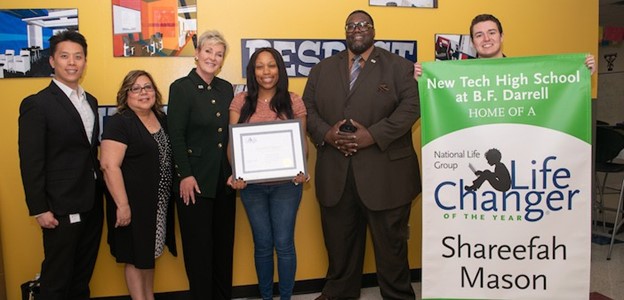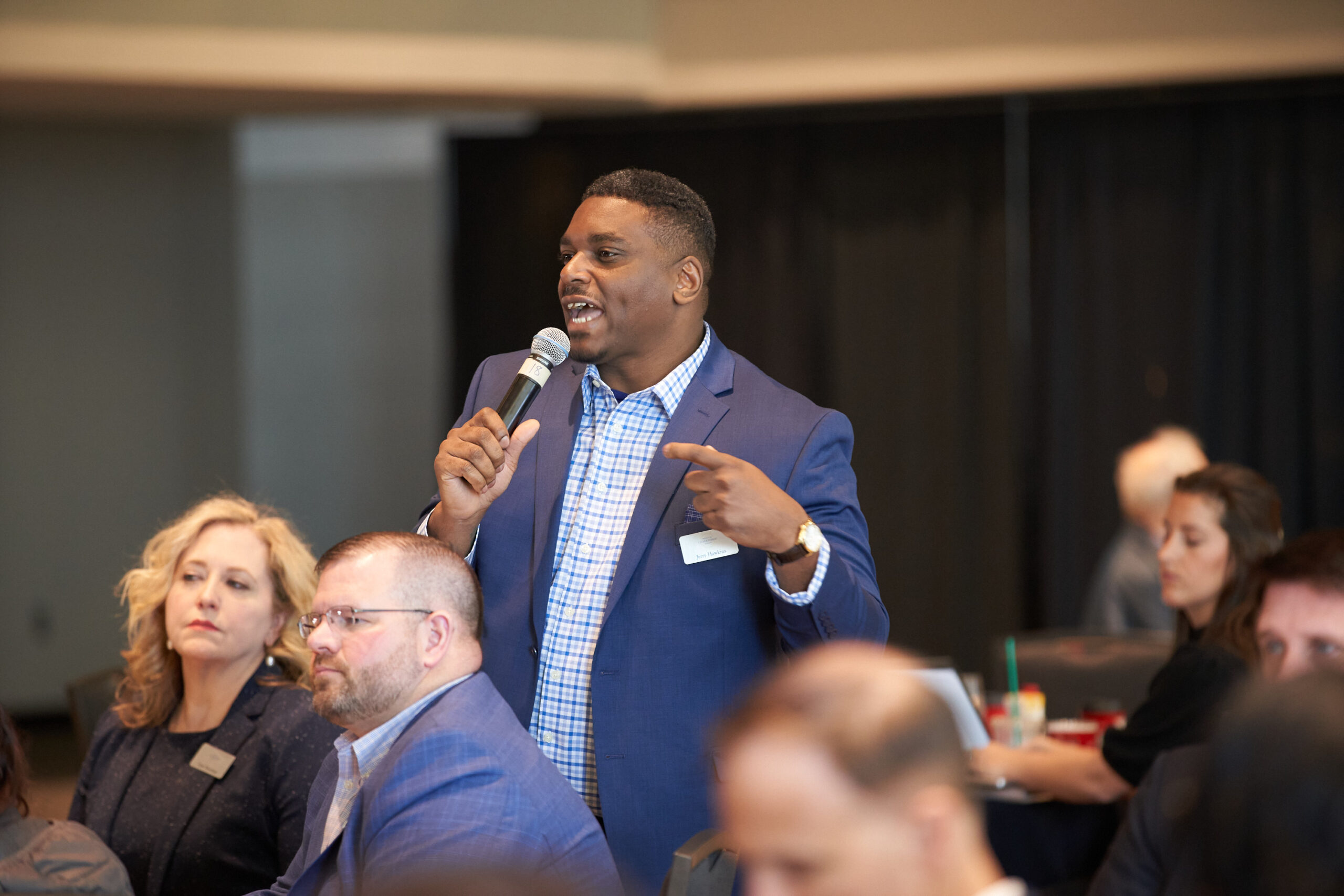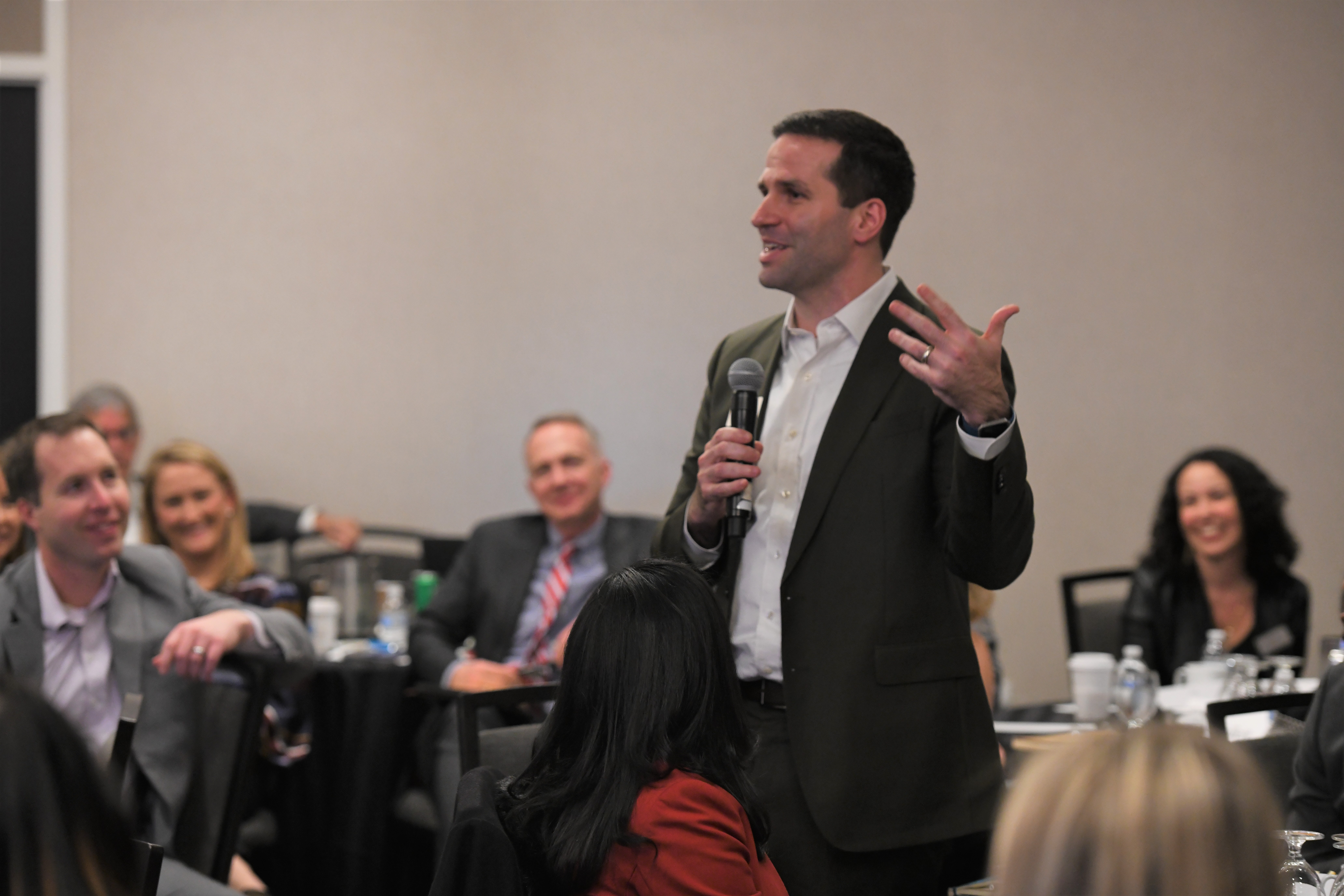Q: Please tell us a little bit about yourself and your personal leadership project (PLP).
I grew up in Columbus, Georgia, and have spent much of my professional career in Atlanta, with brief stints in Boston and Washington, D.C. My wife Jackie and I have been married almost 14 years, and we have four adorable kids, a small fish, and a bearded dragon named “Bruce Willis.”
In our community, Jackie and I are very focused on education. We believe every kid deserves a great education, and that good schools are a gateway to opportunity. As a hobby, I love to write and have just published my third book, The HBR Guide to Crafting Your Purpose. It’s an important topic for me because I think everyone is capable of living a meaningful life but we often allow our own fears and misconceptions about purpose to hold us back.
Professionally, I’ve worked in investments on and off since 2004. At the time I was a Presidential Leadership Scholar (2018), I worked for a large asset manager. For my PLP, I wanted to develop an impact investing capability for my firm. After my term as a Scholar, I was selected to lead our team investing in diverse managers where I put some of that thinking to work. But the topic of my PLP stuck with me, and in 2021 I joined a small investment manager, Sovereign’s Capital, doing nothing but values-based investing. My time in PLS (as well as my time writing about purpose) really encouraged me to go “all in” on the idea that all investing is impact investing and that investing can serve a redemptive purpose in the world.
Q: Please give us an update on what you have been working on since graduating from PLS.
The two biggest projects in my life since PLS have been joining Sovereign’s Capital and writing the HBR Guide to Crafting Your Purpose. At Sovereign’s, we try to invest in ways that encourage “human flourishing” and “love of neighbor,” partnering with entrepreneurs, owners, and fund managers to create great cultures that serve people. It’s remarkably rewarding work, and I wake up every day excited about our mission and the possibility of growing that mission through new investment strategies and through increasing our ability to partner with more leaders, companies, and funds.
My work on the Guide was also heavily influenced by my time in PLS—so much so that it features four women from my PLS cohort whom I came to admire greatly. We are living through a crisis of purpose— when huge numbers of people are feeling lonely, directionless, and disengaged. Part of why it’s so difficult for many of us to live purposefully is a series of fundamental myths we hold about “finding our purpose.” WE don’t find purpose; we build it. And each of us has the opportunity every day to craft more meaningful lives.
I certainly saw this in my classmates. The book features Julissa Carielo, a wonderful entrepreneur in San Antonio who built a construction business from scratch and now also invests in empowering others who would like to start or grow businesses in her community. I had the chance to profile Ezinne Uzo-Okoro, a NASA scientist (now in a senior position in space policy at the White House), who through grit and curiosity is revolutionizing the way we think about space. I was blessed to profile Lisa Hallett, who lost her husband, John, in Afghanistan but used her pain to create a nonprofit (wear blue: run to remember) to remember our fallen service members and to support their families and loved ones. And I got to talk with Tynesia Boyea-Robinson, a leader in the impact space, about her career and how she invests in relationships and connects her work to service. I was blown away by these four in the program, and I honestly wish I could have told all 58 stories from my class.
I think so many of the people I met in PLS were such a fit for a book on living a meaningful life because that’s a focus of the program. We got to learn from four presidents and those close to them about living well-rounded, purposeful lives— serving others, engaging fully in public life, building deep and meaningful relationships, investing in family, and taking on work that matters. And everyone in the program aspires to live that kind of flourishing life as well. It was genuinely inspiring to me.
Q: Which lessons learned during PLS have stayed with you the most?
Gosh, I learned so much in PLS. I actually had the chance to write articles with key learnings from each president— Lyndon B. Johnson, George H.W. Bush, Bill Clinton, and George W. Bush. But if I’m honest, the impression that stuck with me most was the importance of family and of relationships. This really jumped out learning about George H.W. Bush and Barbara Bush.
President Bush was courageous, fiercely competitive, and smart…but his defining characteristic was his deep desire to form relationships with others and to serve them humbly. You could sense that in the way his former staff spoke about him, still dedicated to him after all these years. You could see it in the stories about his relationship with world leaders like Mikhail Gorbachev and the way his ability to form those relationships genuinely shaped the outcomes of the Cold War and the Gulf War. It was a critical part of the way he really invested in building a family of others committed to service. And we got the best sense of it in the genuine love both President Clinton and President George W. Bush had for him. He was a quiet man who seemed to influence others through service. That was a great lesson for me in an era where so many are loud and abrasive rather than kind, humble, and loyal.
Q: How do you put those lessons into action?
Not as well as I’d like to, certainly! We’re all a work in progress, and I have a long way to go. I think I came out of the program recommitted to a well-rounded life— dedicated to my family, my friends, my community, and finding ways to serve others as I’m able. The program and my PLS friends have really helped me think through my shift in career and through my writing. They’ve also been extraordinary thought partners as I’ve considered new opportunities to serve. I’m really inspired by what I see from them— building nonprofits, running for office, serving at the highest levels of government, and building people-centric businesses. And I’m trying to work some of those very admirable traits slowly but surely into my own work and life.
Q: What advice do you have for the 2022 Scholars?
Approach the program and your classmates humbly, with curiosity, and with a commitment to respect and know others. This is a remarkably diverse program in every respect— geography, race, gender, political alignment, profession. Everyone in the program has been chosen carefully for their leadership and for all the traits that make them such a unique human being. If you simply used your six months to ask questions and to learn more fully these outstanding people with whom you’ve been placed, it would be time well spent. And the relationships you form here will last a lifetime. Resist the urge to write others off or jump to conclusions. Any program that intersects with politics has the chance to become heated. But I think PLSers have a rare opportunity to show how remarkably diverse people can approach one another respectfully and can learn from and love one another. That’s a rare gift.


